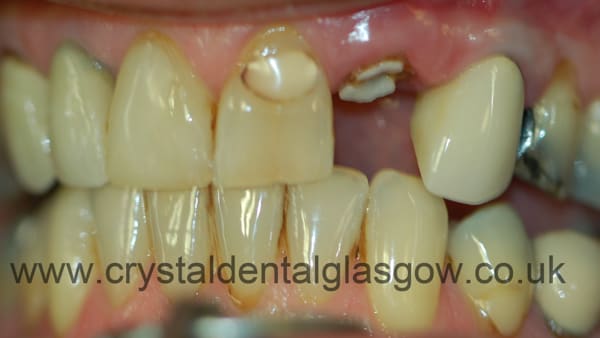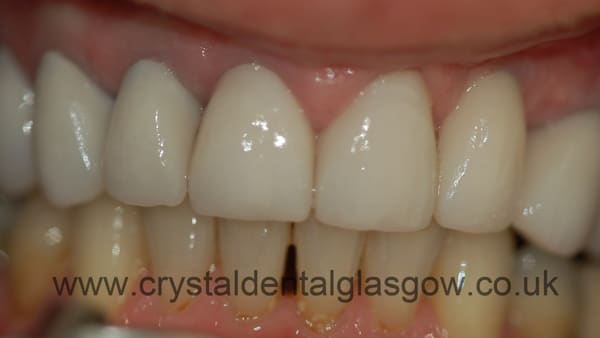Dental Implants Glasgow
Why Choose Dental Implants from our Glasgow Practice?
-
- Preserves your natural smile and face structure
- Offers strength, stability and long-lasting comfort
- Eliminates the need for removable dentures
- Lets you eat your favourite foods with confidence
- Protects surrounding healthy teeth
- Offers the closest thing to having your real teeth back
Missing or damaged teeth? Our implant dentistry services in Glasgow offer a long-lasting, natural-looking solution.
🎥 Watch: Dental Implants Explained
Dr Murphy explains what dental implants are, how they work and the benefits they offer patients.
What is a Dental Implant?
A dental implant is a small metal screw made from titanium. It’s placed into your jaw to act like the root of a missing tooth.
How it works:
- The outside of the implant connects firmly to your jawbone.
- The inside holds parts like gold posts or attachments, which support crowns, bridges, or dentures.
- Titanium is particularly effective as bone can grow and attach to it. This process is called osseointegration.
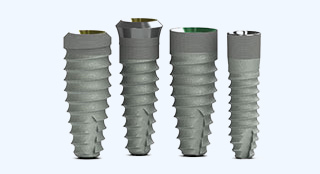
Dr Murphy uses the latest technology in dental implants. As these come in different lengths and widths, including the 3.0mm mini implant, he can select the most-appropriate size to use on the available bone.
Restoring Your Missing Teeth - Mind the Gap
Once your new titanium dental implant is in place, we add an abutment and then the next step is to decide which type of restoration to use on top.
- If you’re replacing a single tooth, we’ll usually fit an implant crown.
- If you're missing two teeth, we may use either two individual implants with crowns or a small implant bridge depending on spacing and bone support.
- For three or four missing teeth, we might use an implant bridge supported by two or more implants. In some situations, especially where several teeth are missing in a row, you might have an implant-retained partial denture.
- When more than four teeth are missing, an implant denture may be the best option for you. This could be a partial denture or a full upper or lower arch. For full arch cases, we often use a method called All-on-4, which supports a fixed bridge or denture on just four strategically-positioned implants.
What to Expect During Your Implant Treatment
- Implants are placed using local anaesthetic (you’ll be awake, but the area will be numb).
- You might feel some swelling or mild discomfort for a few days.
- Most people return to normal activities almost right away.
- We take X-rays and sometimes a CT scan to make sure we choose the right size and position for your implant.
Patient Reviews

I was given an NHS denture by another dentist which was uncomfortable, unsightly and wasn’t great for my speech. Somebody I know put me onto Dr Murphy. He was able to help me out really quickly, first with a high-quality denture to replace the old one and then with my dental implant. The pain side has been very limited, in fact just a few pin pricks from the injections and that was it.
"I was nervous about getting an implant but when the day came I found it a more pleasant experience than having a conventional filling! I would have no hesitation whatsoever in recommending this practice."
Gordon Chapman
"Brendan fitted dental implants for me [and] I never felt one bit of pain during or after this procedure. If you are looking to get any dental work this place is the best."
Pauline Mackie-Gangal
"Came here after doing some research on best places to get a dental implant done. The treatment I received was highly professional and at a competitive price. I couldn't be happier with the end result and would highly recommend to anyone."
Neil Ferguson
Book a free consultation for dental implants in Glasgow today. Call: 0141 334 8792
How Much Do Dental Implants Cost In Glasgow?
| Treatment | Price |
|---|---|
| Dental Implant | £1250 |
| Restored Implant Tooth for example a bridge tooth or crown |
£1250 |
| Implant Dentures With gold locators, not including implant costs |
£2000 to £4000 |
| Implant Dentures With milled titanium bars, not including implant costs |
£5000 |
| Fixed Implant Full arch acrylic, not including implant costs |
£6000 |
| Fixed Implant Whole arch zirconium, not including implant costs |
£9500 |
Success and Reliability of Dental Implants
-
- Clinical research shows dental implants can last for over 5 years, often much longer.
- Dr Murphy has placed hundreds of implants, with success rates that match or beat these results.
- If an implant fails (which is rare), it can usually be replaced at no extra cost.
- Most problems happen in the first year or two, so Dr Murphy waits until the implant is fully integrated before adding the final tooth.
The most popular restoration is the single implant and single crown combination for which you add the costs of the dental implant above and the restored tooth. Please contact the friendly staff at Crystal Dental to make sure you have the most up to date pricing.
Finance for Dental Implants
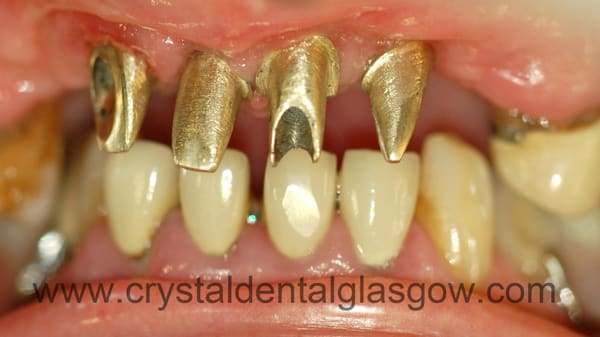
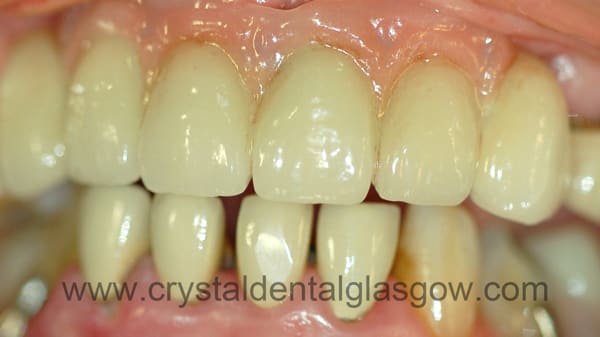
We can help you manage your implant fees. We have two ways we can help you spread the cost of dental implants:
- Flexible payment options for implant treatments in Glasgow — spread the cost or choose interest-free finance.
- Prefer to pay per appointment? Or go interest-free? Our financing options make implants affordable in Glasgow.
Dental Implants Costs In Scotland Compared
The price of dental implants in Scotland varies widely but, according to an independent survey by Dentistry, our implant prices are less than the average cost of an implant restoration in Scotland.
Rest assured we only use top-quality materials and our record on implant work is outstanding. The truth is that in our drive to provide the best-value dental service in Glasgow, implants cost less at Crystal Dental Care.
We understand people shop around for the best deals but if you have ever clicked on one of the voucher code sites offering 70% off teeth implants you will know they seldom have implant offers. Discount or not, any Glasgow dentist still has to cover the cost of top quality materials such as titanium implants, ceramic zirconia bridges and porcelain veneers.
A Wealth of Dental Implant Experience
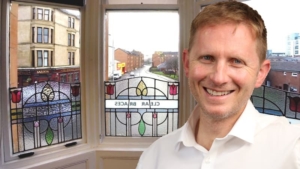
Dr Murphy leads the Glasgow implant team at Crystal Dental Care. He is a very experienced implant dentist having successfully completed an implantology course in Edinburgh in 2005-6 followed by further training at home and abroad. Dr Murphy is a member of the International Team for Implantology as well as the Association of Dental Implantology.
You can find several examples of implant cases in our case studies page as well as before-and-after photographs in the dental gallery.
"When I realised that I needed an implant to replace my crown I wasn’t sure where to go but one of my friends recommended Brendan as he had been there previously and I’m glad that I followed this up. Getting an implant can be a little daunting when you know nothing about it but Brendan was of great help in terms of setting out a plan and also in explaining everything. After a series of scans and fittings I received my implant, also with a bridge as I needed another tooth replacement. If I had to recommend someone to my friends or family for similar treatment I would definitely recommend Brendan." Mike Lamont
A Dental Implants Journey - Step by Step
Here is a great example of what can be done with dental implants to mend broken teeth and restore normal dental function.
This patient came to our Glasgow clinic with a fractured root on an upper incisor along with multiple other dental problems.
In this case study we follow the patient step by step through their implant treatment with a timeline, description of everything involved and the eventual cost for all the cosmetic dentistry.
Unsurprisingly, when you see these before and after photographs the patient was delighted with the outcome of their treatment in Glasgow.
You can find the full story of their implant treatment here.
After Your Implant Surgery
Implants are considered to be one of the most successful types of dental treatment and typically, 95% of patients have no pain, swelling or infection around implants after 5 years.
There is no guarantee, however, that they will last forever and it is principally the care of gums around your implants, which dictates the long-term prognosis.
We offer non-smokers a guarantee that should an implant fail within one year, it will be replaced free of charge.
Peri-implantitis is a condition which can affect the gums around implants causing bone loss. When early diagnosis occurs, peri-implantitis is treatable: it must occur quickly to arrest bone loss as soon as possible.
Fractures in porcelain crown/bridgework or damage to acrylic prosthetic teeth may occur if you use your new ‘teeth’ to bite excessively hard on certain non-food materials. These include tomato sauce/condiment sachets, sellotape, sweetie wrappers, fingernails and similar materials which require a simultaneous biting and pulling action.
The following advice concerns all patients who have received dental implant treatment:
- Brush around teeth and implants twice daily. Brush the inside as much as the outside. Time brushing to last 2.5-3 minutes.
- Clean in between implants twice daily using floss/tepe interdental brushes once daily.
- Visit a dental hygienist every 3-6 months to ensure that implants are scaled/polished with specialist instruments as advised. This also applies to patients without any remaining teeth.
- Return to Dr Murphy for annual checkups and xrays of implants. This is to ensure that bone levels are closely monitored and the areas around your implant are free of significant inflammation, thereby maximising the longevity of dental implant treatments. (Examination fee £19; xrays £11).
- If you smoke, please stop. It is never too late to have a positive effect on remaining teeth and implants going forward. Failing cessation, please cut down on all forms of nicotine with a view to stopping in the long term.
Frequently Asked Questions About Dental Implants
Need help? Be sure to contact us for answers to your questions!
Many of our patients report little or no pain during an implant procedure. In fact they frequently say the only uncomfortable moment comes from the pin prick of injections to numb their mouth.
Dr Brendan Murphy, Implant Dentist
I graduated from the University of Glasgow in 1992 and worked as an associate in Glasgow for four years, before starting a partnership with a trusted university friend.
We purchased six practices, all within the Glasgow area and latterly assisted by an additional partner. Experience acquired over the last nine years involving implant dentistry was a driving force in the decision to go it alone and I now run two practices in Glasgow's West End.
We accept many referrals from colleagues which mostly include professional friends, associates and former associates, although word of mouth seems to have augmented numbers over recent years.
Biohorizons Laserlok implants have undoubtedly changed my implant practises: I am less likely to prescribe more than four implants in a full arch denture case involving locators or milled bar with attachments.
Like many treatment providers, we have become obsessed with audit numbers. Implant dentistry has been the beneficiary of this trend, however, as we have seen early implant failures almost completely disappear.
Most dentists refer cases for implant borne crown and bridgework to us, although more of us are now considering the various denture alternatives involving a multitude of abutment types.
Cases may be taken from start to finish or returned to the referring dentist for prosthetic stages, depending on the preference of the referrer.
It is a fundamental requirement that they go back to their dentist for regular recall examinations and routine care, particularly in light of heightening concerns regarding early diagnosis of peri-implantitis.
Implants and Bone Loss - Making Implants Possible
Older people and patients who have had a missing tooth for several years often lack sufficient bone for an immediate implant. However we have ways of improving their bone situation to the point where we can proceed with implant treatment.
Sinus bone augmentation
Shortage of bone in the upper jaw can occur as a result of bone loss in the sinus area, both internally and also due to the bone loss around the tooth roots following tooth loss. This shortage of bone height below the maxillary sinus may not allow the placement of implants of suitable length.
We sometimes therefore need to carry out sinus bone augmentation in order to facilitate the placement of implants of a suitable size.
Sinus augmentations are a routine procedure and common adjunct to implant therapy in this part of the mouth and are very predictable and carry a very high success rate in my experience.
In fact, research shows that implants placed into sinus grafts have a higher success rate than those in regular maxillary bone. Once again, we are talking of success rates in excess of 95%.
This procedure involves raising the sinus lining and placing a bone material into the space we create. This is usually left for several months during which time the graft usually consolidates and becomes suitable bone in which to place implants of a sufficient length.
If there is 4-8mm of bone at the start of treatment we will often place implants and augment the sinus simultaneously. Sinus augmentations are generally carried out with local anaesthetic as with normal dental treatment.
Local and Block Grafting
Local grafting involves the use of materials to cover up small defects where bone has been damaged by infection, root fractures and minor trauma before the tooth was extracted. It can also cover exposed threads on implants when the ridge of bone is thin near its surface.
A charge is levied in this instance to cover material costs. Bone may be carefully removed from other areas of the mouth to supplement deficient bone where implants are required. This is called block grafting.
Graft Materials
The material we often use is called BioOss, a de-proteinated bovine bone mineral. You can be assured that it is an absolutely safe material (no organic components remain after laborarory preparation) and it has been subject to a huge amount of research all over the world, with an absence of negative feedback.
This is unusual in the dental field. BioOss has been proven to be the best material in sinus grafts and the most recently published figures confirm that success rates are as good as for implants placed without sinus involvement. A porcine membrane is often used to protect local or sinus grafts.
Once integrated and functioning, the overall research shows that you have in excess of a 90% chance of any implant still performing fine after 25 years.
Therefore implants are a long term and predictable treatment option, probably a lifetime.
There is around a 20% risk of swelling +/- bruising following implant surgery and a slight risk (of 1%) that an adjacent tooth can be damaged leading to requirement of root canal treatment (this compares to a risk of 20% during crown or bridge preparation).
When working in the lower molar area there is a chance of damage to adjacent nerves. This can cause temporary numbness or pain and is very rarely permanent. A scan is advisable when bone levels are limited in this and other areas.
There is a small risk of graft rejection which may necessitate the use of pink porcelain (with a small additional technician’s fee if required).
Pink porcelain can disguise spaces and allow for normal tooth proportion in cases where gum tissue has been lost.

